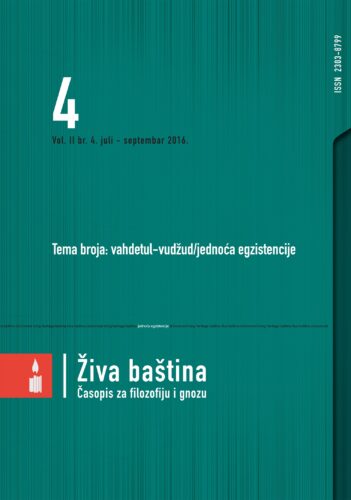Teorija jednoće egzistencije (vahdetul-vudžud) koncipirane od gnostika (arifa) bila je predmetom mnogih kritika stoga što je daleka razumu i zbog neslaganja sa spoljašnjim značenjima nekih dijelova svetih tekstova. Neke pristalice ove teorije, kako bi umanjili ove kritike, interpretirali su je kao duhovno osvjedočena jednoća (perz. vahdet-e šuhud) radije je smatrajući epistemološkim pitanjem negoli ontološkim. U ovom članku nastojat ćemo ovo pitanje razmotriti sa stanovišta dva velika arifa – Ibn Arebija muslimana i Ekharta kršćanina – te pokazati kako razlikovanje jednoće egzistencije i duhovno osvjedočene jednoće prema načelima arifa nije ispravno i prema njihovom stanovištu ovo su dvoje jedna te ista stvar. Oni ne vjeruju u postojanje distinkcije između uma / subjektivnog (zihn) i objektivnog (ajn).
Pantheism or the unity of the intuition of Ibn Arabi and Eckhart
The theory of existence (wahdatul-vujud), developed by mystics (arifs), was subject to many criticism because of its distance from reason and due to its opposition to outer meanings of some parts of sacred texts. In order to mitigate such criticism, some supporters of this theory have interpreted it as the spiritual testimony of the oneness (Persian: vahdet-e šuhud), observing it as an epistemological issue rather than an ontological one. The article discusses this issue from the perspectives of two great arifs: Ibn Arabi, a Muslim, and Ekhart, a Christian, and demonstrates that the distinction between the oneness of existence and the spiritual testimony of oneness, in accordance to the arifs’ principles, is not correct, whereby, according to their standpoint, these two are the same. They do not believe in the existence of distinction between mind / the subjective (zihn) and the objective (ajn).
[tags]

